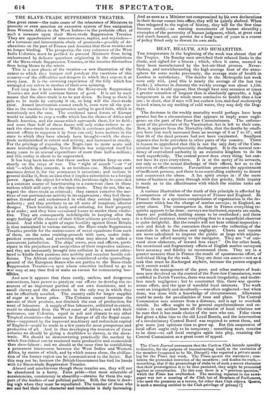HEAT, HEALTH, AND HUMANITIES.
THE temperature in the beginning of the week was almost that of the Tropics. On Sunday men stretched their relaxed limbs in the shade, and sighed for a breeze ; which, when it came, seemed to have been manufactured by the hot-air-blast process. Never- theless, and notwithstanding the high average heat of the atmo- sphere for some weeks previously, the average state of health in London is satisfactory. The deaths in the Metropolis last week were only 855, (and this is nearly the average of the last ten weeks ; ) whereas in January the weekly average was about 1,150. From this it would appear, that though heat may occasion at times a greater sensation of languor than is absolutely agreeable, a high temperature is on the whole more conducive to health than a low one ; in short, that if men will but eschew ices, and deal moderately in iced wines, to say nothing of cold water, they may defy the Dog- days.
The decrease in the weekly mortality would perhaps have been greater but for a circumstance that appears to imply some negli- gence on the part of the Poor-law Commissioners. The enforce- ment of the provisions of the Vaccination Act is left to their care. Now, it appears from the Mortality-bills, that the deaths by small- pox have last week increased from an average of 6 or 7 to 47; and that 36 of the dead persons had not been vaccinated. Smallpox appears also to be prevalent in other parts of the country. There is reason to apprehend that this is not the only duty of the Com- mission that is too perfunctorily discharged. It is the natural ten- dency of centralized authority in an extensive kingdom to do its work superficially. The central power does every thing, but can- not have its eyes everywhere. It is at the mercy of its servants, not only as to the actual discharge of their offices, but as to the selection of office-hearers. Favouritism procures the appointment of inefficient persons, and there is no controlling authority to detect and counteract the abuse. A lax spirit creeps in : if the mere forms of business are gone through with due gravity, little inquiry is made as to the effectiveness with which the routine tasks are formed.
A curious illustration of the truth of this principle is afforded by a comparison of the marine surveys of France and England. In France there is a specious completeness of organization in the de- partment which has the charge of marine surveys; in England, an utter chaos. The consequence is, that in France everything re- quisite appears to be done : surveys are instituted, reports are made, charts are published, nothing seems to be overlooked ; and there is a finished neatness about everything that to a superficial observer is quite delightful. But the results will not bear critical inspection : care and finish in the execution there are—the collecting of the materials is often heedless and negligent. Charts and reports are more calculated to impress the public at large with admira- tion than to afford security to the navigator. They are " of out- ward show elaborate, of inward less exact." On the other hand, the occasional and fragmentary efforts of English marine surveyors have accuracy and fidelity to recommend them. They are in a greater measure than in France the result of spontaneous effort, of individual liking for the task. They are done con amore—not as a task that must be discharged anyhow, because the person engaged on it cannot avoid it.
When the management of the poor, and other matters of busi-
ness now devolved on the control of the Poor-law Commission, were confided to Parish Vestries, there was much irregularity, and doubt- less much negligence ; but to counteract this, there was sponta- neous effort, and the spur of watchful local interests. The work went on irregularly and desultorily—was often neglected—but when done, was done with a knowledge of circumstances. Allowance could be made for peculiarities of time and place. The Central Commission sees matters from a distance, and is apt to overlook details. Its office ought to be general superintendence and re- vision : it can neither learn all the minutiae of local relations nor be sure that it has made choice of the men who can. False views had given a false bias to the old Local Boards, and the intervention of a revolutionary Central Board was required to arrest them, and give more just opinions time to grow up. But this suspension of local effort ought only to be temporary : something more remains to be done—to call local energies again into play, retaining the Central Commission as a great court of appeal.


























 Previous page
Previous page